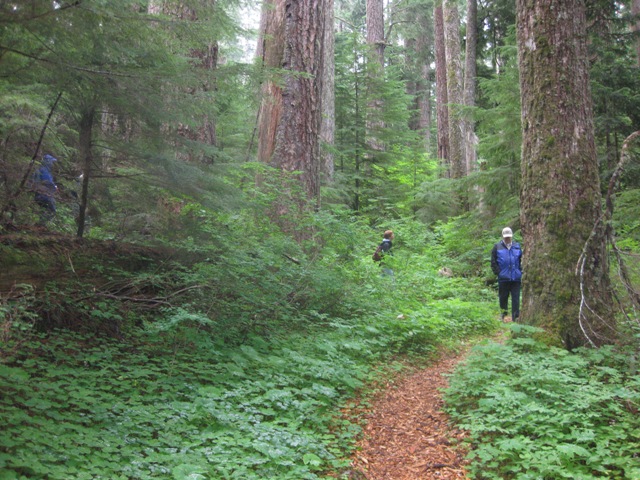As I shared in my sermon at St. Andrew Lutheran (Beaverton, OR) this morning, this Sunday’s Gospel reading reminded me of an experience I had on a week-long retreat of all of the fifth graders at my elementary school. Students were divided into groups that were each assigned to a different teacher for an exercise in orienteering. We were given compasses and told to use a map to find various checkpoints attached to trees or rocks in an unfamiliar landscape on the edge of the camp.
Midway through the course, we stood on the edge of one forest looking out across a large field towards another forest. One of my classmates thought we should head towards a tree over to the left while another was convinced we should head towards that rock to the right. Kids quickly ran off in different directions, none of which led to the next checkpoint. Some began randomly looking behind rocks and up in trees. Others of us alternated between blindly following our peers running this way and that and standing out in the middle of the field feeling totally lost.
It is not a good feeling, that feeling of being totally lost and having no idea of where to go or what to do. I have felt it quite a few times in my life: once when I did get lost in the wilderness all alone, once when I got lost on a six mile run in Budapest during communist days and was unable to speak the language, once when in an inflatable inner tube that drifted too far out into the ocean, once when coaching cross country and one of my kids got really sick with heat stroke, and more than once in a time of heart-breaking grief. The experience in fifth grade wasn’t quite as bad as some of those that would follow, but it was my first time away from home for a week, and it heightened my sense of disorientation.
Finally, Mr. Krebbs gave a loud whistle and called us back to the previous checkpoint. He told us all to look at our compasses again and consult our maps. He patiently coached us while we talked it through and agree upon a direction to proceed. Soon we had found the next checkpoint together, and were on our way. I can’t remember if we won or lost that orienteering competition. But I do remember that in order to find our way through the wilderness, we needed our compasses and we needed each other.
In today’s Gospel lesson,  Luke tells us about that time in the ministry of Jesus when he went on a kind of vision quest being tempted by the devil in the wilderness. Biblical scholar Ched Myers who Portland will be fortunate enough to host for a free lecture at Augustana Lutheran Church Thursday evening, April 11th and an all day workshop on Friday, April 12th at St. Andrew Lutheran in Beaverton has said, “Make no mistake that wilderness places are free spaces, and they are also dangerous places. Thomas Merton said that the demons start roaring when we go out into the wilderness. We also know that the faith of Biblical people begins in the wilderness.”
Luke tells us about that time in the ministry of Jesus when he went on a kind of vision quest being tempted by the devil in the wilderness. Biblical scholar Ched Myers who Portland will be fortunate enough to host for a free lecture at Augustana Lutheran Church Thursday evening, April 11th and an all day workshop on Friday, April 12th at St. Andrew Lutheran in Beaverton has said, “Make no mistake that wilderness places are free spaces, and they are also dangerous places. Thomas Merton said that the demons start roaring when we go out into the wilderness. We also know that the faith of Biblical people begins in the wilderness.”
The story of the Exodus is one in which people leave their safe and predictable lives to follow God into the wilderness for 40 years to learn what it means to be truly free and to follow God. Going from captivity to freedom most always begins with a wilderness encounter. According to Ched Myers, it is therefore no coincidence that Jesus goes out into the wild wilderness to let John baptize him in the wild water and that the Spirit thenleads him out into the wilderness to face temptations to take the path of comfort, security, or power.
Joy Carol Wallis is a pastor in the Church of England who has said, “We go to great lengths to have an easy life. Health and wealth we want it now. We want God to speak to us now, to guide us now, to heal us now. And Jesus is saying: No, have patience. Be in the wilderness and discover how to rely on God. Simplify your lifestyle, reject the easy answers, and the wilderness journey will start to teach you something about trust in God and how to serve God with your heart, your soul, and your mind. God’s way of transformation is not spectacle, but the patient enduring of the wilderness and the cross.”
_________________________________
p.s. To learn more about the Portland, Oregon lecture and workshop with Biblical Scholar Ched Myers on April 11-12, 2013, click here: http://test.ecofaithrecovery.org/ched-myers/. To sign up to receive these Lenten reflections and subsequent blog posts directly to your email account, click here or on the link in the upper left sidebar of any page at test.ecofaithrecovery.org. We welcome you to share these reflections and your response with others.
